Pakistan’s legal system still treats citizens as subjects
Lawyers, journalists underscore human cost of colonial influence on country's criminal code at HRCP conference
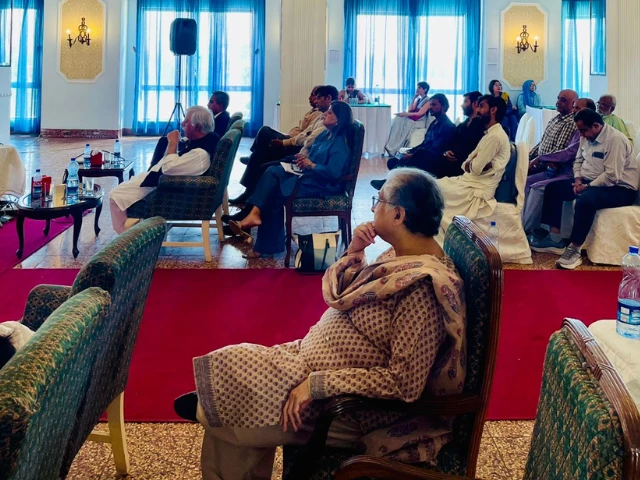
When journalist and researcher Nazish Brohi visits Sea View around Independence Day she asks people what it means to them. “They refer to freedom from Indians or Hindus. Rarely do they mention independence from the British.” Many people fail to acknowledge that true independence should also mean ‘azadi’ from the British Raj.
Brohi was speaking at a conference on ‘Decolonizing the Law: Human Rights and Legal Reform in Pakistan’ organised by the Human Rights Commission of Pakistan on Thursday.
Pakistan may have achieved independence from the British 78 years ago but its legal system still operates in the shadow of colonialism.
Brohi observed that Pakistan’s legal and political order still carries the baggage of a colonial “civilising mission”. The state continues to treat its people as “riaya”—subjects to be ruled—rather than as “shehri,” equal citizens with rights.
“These laws were created by the British to maintain control over the population, and we are still operating under the same legal framework today,” said the HRCP’s secretary-general, Harris Khalique. Imagine, the Pakistan Penal Code was introduced over a century and a half ago and still dictates law and order, as was the Criminal Procedure Code (circa 1898).
Read: HRCP report highlights rights, security crisis
Colonial-era regulations clash with Pakistan’s democratic aspirations whether they are sedition laws that stifle freedom of expression or penal codes that restrict public assembly,.
“Turning a blind eye to violence against minorities while using 124-A to stifle legitimate dissent reeks of selective law enforcement,” said Asfandyar Katchela, a law student at Lahore University of Management Sciences.
He traced the section’s evolution, noting that sedition wasn’t even in the first 1860 code — it was added in 1870 by James Fitzjames Stephen and expanded in 1898 by Justice Strachey to cover even ‘hatred’ and ‘contempt’. The provision, he said, has mutated through Prevention of Electronic Crimes Act which is being invoked to silence online dissent and journalists.
England scrapped the offence in 2009, with other countries such as New Zealand and Australia following suit. Pakistan, meanwhile, carried with Strachey's much criticised interpretation. “It shows how a colonial tool has survived here mainly to police dissent,” he added.
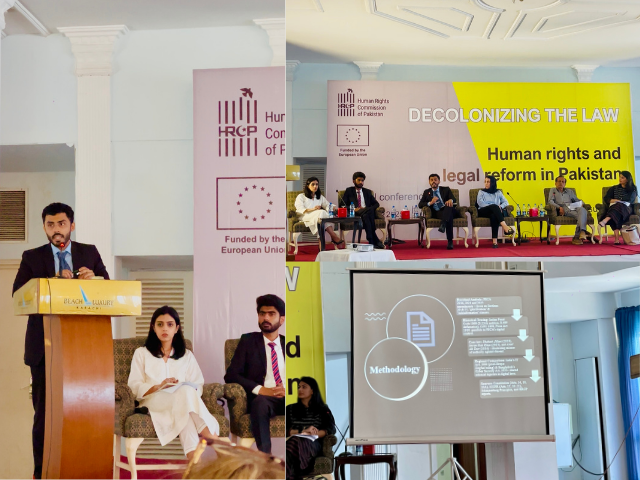
Speakers deliver presentations on their research work at HRCP
Tech colonisation
People and society are not the only ones who can be colonised. New laws regulating digital spaces are entrenching state surveillance and hemming in public freedoms.
“PECA mirrors the colonial sedition laws, but now in the digital realm,” said lawyer Simra Sohail. “It criminalizes speech in the same way the British did.”
When selectively applied, these laws allow the state to target dissent and control freedom of expression. Sohail emphasized how these laws, when selectively applied, allow the state to target dissent and control freedom of expression. "Panic, fear and similar words are subjective," she said, pointing out that such vague restrictions under Article 19 of the Constitution provide ample room for manipulation and misuse of the law.
Sheikh Sibghat Ullah, legal counsel, added, “PECA may appear to be cybersecurity legislation, but fundamentally it is a tool of surveillance. It mirrors the colonial logic of controlling public discourse under the guise of national security.”
One solution is to align PECA laws with Article 19 of Europe’s human rights standards, which protects freedom of speech with more precise definitions.
Journalist Mazhar Abbas cautioned though that the judiciary’s role cannot be ignored. “The problem is not that laws are being made,” he said, “the issue is that the judiciary is stamping these laws, including PECA.”
Former Chief Justice Maqbool Baqar argued that true reform demands a fundamental break from colonial frameworks. There is a human toll of these laws. “Journalists are silenced, farmers displaced, and protestors jailed without charge,” he said.
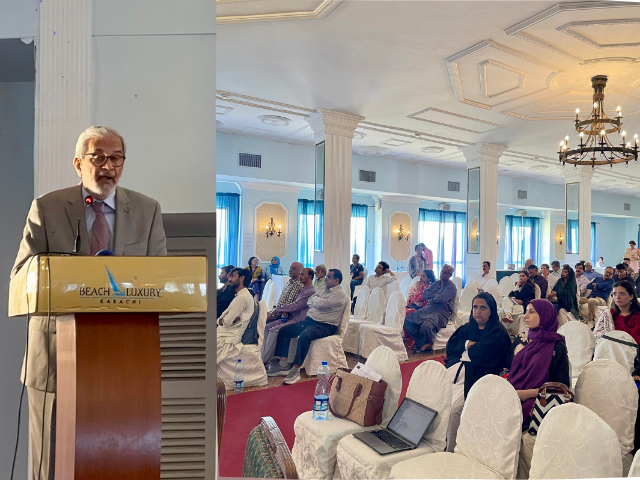
Justice Baqar addresses the audience
Read More: Quivering shapes help documentary explore fixed ideas of Pakistan's blasphemy law
Blasphemy laws
Of course, some laws were framed as a response to colonialism and rebranded authoritarianism using Shariah law, especially during the Ziaul Haq era. Section 295-C, for example, was first introduced during British rule, but was expanded after Independence. Section 295-C, originally carrying a life sentence, was amended to include the death penalty, disproportionately affecting religious minorities, especially the Ahmadis. “While blasphemy laws exist globally,” said lawyer Asfandyar Waraich. “Pakistan’s are uniquely severe.”
Human rights lawyer Hina Jilani, co-founder of Pakistan’s first legal aid center, stressed that colonialism isn't the root cause of Pakistan’s inequality. “Reforms should address systemic imbalances and integrate indigenous perspectives,” she stated. She referenced Articles 21, 295, and 298, noting their disproportionate impact on marginalized communities.
The focus shifted to Balochistan, which journalist Akbar Notezai described as a “colony within Pakistan.” Mining projects such as Reko Diq and Saindak, which deplete water resources, with six villages in Saindak still lacking basic amenities are examples of this at work. The region’s military presence and enforced disappearances reinforce the colonial-style extraction of resources.
Also Read: HRCP slams discriminatory ban on Ismaili butchers in Chitral, warns of threat to pluralism
Sadia Farooq Azeemi, from the Lahore Biennale Foundation, highlighted how urban development and national security policies reinforce class divisions. “Barriers, checkpoints, and surveillance are creating a ‘city within a city,’” she said, pointing to how these measures limit movement and solidify social inequality. She also mentioned the Chinese Embassy barriers in Lahore, linking national security concerns to social disparity, and referenced ongoing surveillance in FATA.
In his remarks, Justice Baqar underscored the way forward: “We need to repeal laws that criminalise dissent and target vulnerable groups. It is essential to dismantle policies and practices that shield abuses of state power. Judicial independence must be guaranteed, free from political interference and systemic biases, while community participation has to be embedded in the law-making process. Above all, we must theorise Islamic principles of justice rooted in fairness and compassion.”

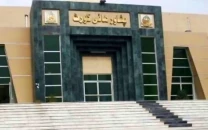
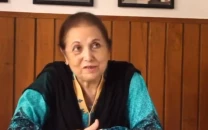

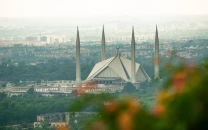
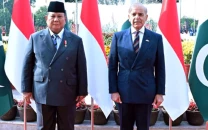
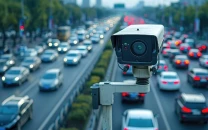















COMMENTS (1)
Comments are moderated and generally will be posted if they are on-topic and not abusive.
For more information, please see our Comments FAQ